Chapter 63
Tao Te Ching
(Dao De Jing)
Classic of the Way and Virtue

By Lao Tzu (Laozi)
Compiled and Indexed by Michael P. Garofalo
Green
Way Research, Valley Spirit
Center, Gushen Grove Notebooks, Vancouver, Washington
Chapter 62
Chapter 64
Index to All the Chapters
Daoism
Concordance
Commentary
Cloud Hands Blog
English Chinese
Spanish
Chapter
63
Tao Te Ching
(Dao De Jing) by Lao Tzu
Classic Book (Ching) about the Tao (Way, Nature, Patterns, Processes) and
Te (Virtue, Potency, Power, Integrity, Wise Person, Sage)
Concordance: Indexing, Search
Terms, Topics, Themes, Keys, Subjects
English and Chinese (Wade-Giles) Terms:
A Consideration of Beginnings, Act or Do (wei), Deal with the Great While it is Small,
Practice or Work (shih), Do Without
Doing, Avoid Anger,
Practice Non-Practice, Know (chih), Taste or Savor (wei), Great (ta),
Small (hsiao), Few (shao), Return or Repay (pao), Hatred or
Malice (yüan), Virtue or Goodness (tê), Plan or Prepare (t'u), Difficult
or Hard (nan), Easy (yi), Earth or World, or Down Below Heaven ( (t'ien
hsia), Affairs or Activities (shih), Arise or Start (tso), Taste Without Tasting, Return Love for Hate, Think at the
Start, Patience, Reversing, Sage or Wise Man or Saint (shêng jên), Details, Anger,
Keep it Simple, Utmost or End (chung), Easy, Plant, Detachment in Actions, Nurturing,
Accomplish (wei), Finish or Succeed (ch'êng), Frivolous or Rash (ch'ing),
Truth or Sincerity (hsin), Problems, Promise or Agree (no), Flavorless, Anger, Injury (yüan),
Virtue, Impartiality, Sage, Beginning, Starting, Love, Hate, Gentle,
Non-Interference, Non-Coercion, Piecemeal, Disinterested, Inner Life, Nothing to
Do (wu wei), 恩始
Términos en Español:
Un Examen de los
Principios, Tratar con
la Gran Aunque es
Pequeño, Hacer
sin Hacer, Practicar la No-Práctica,
Saber, Sabor sin Probar,
Retorno Amor por Odio, Piensa
en la Salida, Paciencia, Sabio,
Santo, Difícil, Pequeño, Detalles, Fácil, Ira,
Plantar, Sembrar, Destacamento de
Acciones, Nutrir,
Lograr, Problemas, Sin Sabor, Cólera,
Accidentes, Virtud, Imparcialidad,
Partir, Amor, sin Injerencia,
sin Coerción, Por Etapas,
Desinteresado,
Vida Interior, Nada que Ver,
Ley, Práctica,
Trabajo, Grande,
Pequeño, Pocos,
Retorno, Pagar,
Odio, Malicia, Virtud,
Bondad,
Difícil, Duro,
Mundial,
Tierra, Cielo Abajo,
Asuntos, Actividades, Levántate,
Inicio, Hombre Sabio,
Máxima, Fin,
Finalizar, Frívolo, Promesa,
Acuerdo, Verdad, Sinceridad.
Electronic Concordance for all 81 Chapters of the Tao Te Ching
English
Language Translations of the Tao Te Ching
"Do without "doing."
Get involved without manipulating.
Taste without tasting.
Make the great small,
The many, few.
Respond to anger with virtue.
Deal with difficulties while they are still easy.
Hand the great while it is still small.
The difficult problems in life
Always start off being simple.
Great affairs always start off being small.
Therefore the sage never deals with the great
And is able to actualize his greatness.
Now light words generate little belief,
Much ease turns into much difficulty.
Therefore the sage treats things as though they were difficult,
And hence, never has difficulty."
- Translated by
Charles Mueller, 2004, Chapter 63
"Practice no-action;
Attend to do-nothing;
Taste the flavorless,
Magnify the small,
Multiply the few,
Return love for hate.
Deal with the difficult while it is yet easy;
Deal with the great while it is yet small.
The difficult develops naturally from the easy,
And the great from the small;
So the sage, by dealing with the small,
Achieves the great."
- Translated by
Peter A. Merel, 1992, Chapter 63
"Act by means of inaction;
Deal with matters by means of not being meddlesome;
Taste by means of tastelessness.
The big stems from the small;
The many is based on the few.
To overcome the difficult should begin with the easy;
To accomplish what is big should begin with the small.
The difficult things in the world must originate in the easy;
The big things in the world must take root in the small.
That is why the sage can accomplish what is great
by never attempting to be great.
Light promise-giving, light promise-breaking;
The easier one considers things, the more difficult things become.
That is why the sage never meets with difficulty
Because he always considers things difficult."
- Translated by
Gu Zhengkun, Chapter 63
"One does things so that one needs to do nothing.
One takes actions so that one needs no action.
One tastes so that one can appreciate tastelessness.
One values what is small or little, and returns good for evil.
One starts from the easiest to achieve the most difficult.
One starts from the most trivial to achieve the highest.
For it is only by taking easy measures
That one can achieve the most difficult in the world.
It is only by taking trivial steps
That one can achieve the highest in the world.
Therefore, the wise person who never looks important
Is able to be the most important.
Those who make hasty promises can rarely keep them.
Those who think nothing difficult will have many difficulties.
That is why the wise person worries about difficulties
And can therefore solve them successfully."
- Translated by
Liu Qixuan, Chapter 63
"Do by not doing, act by nonacting, taste the taste-less, regard the small as great, much as little.
Plan what is difficult where it is easy; do what is great where it is minute.
The hardest things in the world begin with what is easy; the greatest things in the world begin with what is minute.
Therefore the Saint never does anything great and so is able to achieve the great.
Now, he who promises lightly, will have but little faith. He who finds much easy, will find much hard.
Therefore the Saint, while finding even (the easy) hard, will in the end have nothing that is hard."
- Translated by Jan
J. L. Duyvendak,
1954, Chapter 63
"Do the Effortlessness.
Try for the effortless.
Enjoy the joyless.
Raise high the low.
Multiply the few.
Return hurt with kindness.
Stop troubles in the beginning.
Plant the great with the small.
Difficult things of the world.
Can only be tackled when they are easy.
Big things of the world
Can only be completed by paying attention to their small beginnings.
The Complete Thinker never has to struggle with the big things,
But they alone are capable of completing them!
They who promises lightly must be lacking in faith.
They who thinks everything easy
will end by finding difficulty.
The Complete Thinker,
who regards everything as difficult,
Meets with no difficulties in the end."
- Translated by
J. L. Trottier, 1994, Chapter 63
"Act by Doing Nothing Much Personal;
handle affairs through noninterference.
Taste what has no flavor;
regard the small as great, the few as many.
Repay resentment with DEI-ty's virtues.
Undertake
difficult tasks
by appreciating what is easy about them.
Do great deeds
by focusing on their little details.
All
difficulties under heaven arise from what is simple;
all great things under
heaven depend upon little details.
Thus,
Sages never strive to do what is great;
therefore they can achieve greatness.
One
who lightly agrees
is seldom believed;
One who thinks everything is
going to be easy
encounters many problems!
Consequently,
even Sages consider things difficult;
and thus, find them easier than they
thought, in the end."
- Translated by
Jerry C. Welch, 1998, Chapter 63
"Do the Non-Ado.
Strive for the effortless.
Savour the savourless.
Exalt the low.
Multiply the few.
Requite injury with kindness.
Nip troubles in the bud.
Sow the great in the small.
Difficult things of the world
Can only be tackled when they are easy.
Big things of the world
Can only be achieved by attending to their small
beginnings.
Thus, the Sage never has to grapple with big things,
Yet he alone is capable of achieving them!
He who promises lightly must be lacking in faith.
He who thinks everything easy will end by finding
everything difficult.
Therefore, the Sage, who regards everything as difficult,
Meets with no difficulties in the end."
- Translated by
John C. H. Wu, 1961, Chapter 63
"Strive not to struggle — achieve just by being.
Savor the flavorless — value the unimportant.
Meet unkindness with compassion.
Tackle difficult jobs while they are still easy, and big jobs while they are
small.
The troubles of the world can only be solved before they get out of hand.
The great affairs of the world can only be sorted out,
by paying attention to
all the small things.
The Wise don't attempt anything great, and so achieve great things.
Someone who promises the world will never live up to that promise.
Someone who thinks everything is easy will inevitably find things hard.
The wise don't avoid difficulties, so nothing remains difficult."
- Translated by
Timothy Freke, 1999, Chapter 63

This webpage work is licensed under a Creative Commons Attribution-NonCommercial-NoDerivatives 4.0 International License.
Created by Michael P. Garofalo,
Green
Way Research, Valley Spirit
Center, Gushen Grove Notebooks, Vancouver, Washington © 2020 CCA 4.0
Tao Te Ching Translated by Arthur Waley
Translated by Arthur Waley
Tai Chi Chuan, Qigong,
Taoist Body-Mind Arts and Practices
How to Live a Good Life:
Advice from Wise Persons
Tao - The Way Translated by Lionel and and Herbert Giles
Translated by Lionel and and Herbert Giles
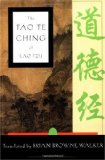

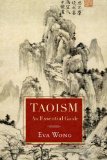
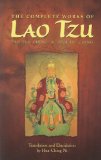
"It is the way of the Tao to act without thinking of
acting;
To conduct affairs without feeling the trouble of them;
To taste without discerning any flavor;
To consider what is small as great, and a few as many;
And to recompense injury with kindness.
The master of it anticipates things that are difficult while they are easy,
And does things that would become great while they are small.
All difficult things in the world are sure to arise from a previous state in
which they were easy,
And all great things from one in which they were small.
Therefore the sage, while he never does what is great,
is able on that account
to accomplish the greatest things.
He who lightly promises is sure to keep but little faith;
He who is continually thinking things easy is sure to find them difficult.
Therefore the sage sees difficulty even in what seems easy, and so never has any
difficulties."
- Translated by
James Legge, 1891,
Chapter 63
Cloud Hands Blog
"Act without considering it to be acting.
Work without considering it to be working.
Taste without considering it to be tasting.
Big or small, many or few - respond to complaints with virtue.
Plan for difficult times when they're still easy to change.
What becomes enormous was once something minute.
All the difficulties in the world arise from what was originally easy to change.
Everything enormous in the world arises from what was originally minute.
It's natural for the wise person to end up not having to act on what's become
enormous,
and therefore has the ability to achieve what's great.
You see, lightly making promises must show a lack of sincerity.
If many things are taken lightly, then many things will cause difficulty.
It's natural for a wise person to keep in touch with what might become
difficult.
Therefore, he ends up without difficulties."
- Translation by
Nina Correa, 2008, Chapter 63
"Do without doing,
Act without action.
Savor the flavorless.
Treat the small as large, the few as many.
Meet injury with the power of goodness.
Study the hard while it is still easy.
Do big things while they are small.
The hardest jobs in the world start out easy, the great affairs of the world
start small.
So the wise soul, by never dealing with great things, gets great things done.
Now, since taking things too lightly makes them worthless,
And taking things too easy makes them hard,
The wise soul, by treating the easy as hard, doesn't find anything hard."
- Translated by
Ursula K. Le Guin, 1998, Chapter 63
"Practice flowing in peace and harmony.
Work without laboring.
Savor the tasteless.
Enlarge the small.
Multiply the few.
Mitigate bitterness with kindness.
Accomplish difficult endeavors by a series
of easy tasks.
Accomplish great deeds by persisting
in mundane acts.
When one flows in peace and harmony and
perceives the oneness in all things:
difficulties are easily overcome and
great accomplishments are
seen as a compilation of a lifetime
of insignificant days.
The sage never tries to achieve greatness.
She flows in peace and harmony and
at the end of her days comprehends her
legacy.
Cursory promises are generally unreliable.
Neglecting basics fosters difficulties.
The sage considers the potential difficulty in all
things
and circumvents them by flowing in peace and
harmony."
- Translated by
John Worldpeace, Chapter 63
"Treat lack of achievement as the achievement,
treat lack of accomplishment as the accomplishment,
treat lack of flavor as the flavor.
Make the small big, make the less more, return hatred with De.
Solve problems while they are simple; accomplish big things while they are small.
The most difficult tasks in the world can only be finished if you attack them while they are simple;
The most important things in the world can only be accomplished if you start them while they are small.
Therefore, the great men never started with big things, so they accomplished big things.
Promises made easily have no credibility; if you view everything as easy, you will meet many difficulties.
So, the great men tried to find as many difficulties as possible, so they never had difficulties."
- Translated by
Xiaolin Yang, Chapter 63
Tao Te Ching Translated by Stephen Addiss and Stanley Lombardo
Translated by Stephen Addiss and Stanley Lombardo
Lao Tzu: Tao Te Ching Translated by John C. Wu
Translated by John C. Wu
Tai Chi Chuan, Qigong,
Taoist Body-Mind Arts and Practices
How to Live a Good Life:
Advice from Wise Persons
Lao-Tzu and the Tao-Te-Ching Translated by Livia Kohn
Translated by Livia Kohn
Dao De Jing: The Book of the Way Translated by Moss Roberts
Translated by Moss Roberts
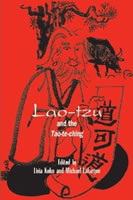
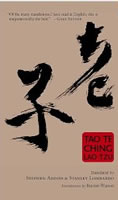
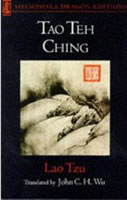
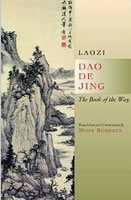
"Accomplish do-nothing.
Attend to no-affairs.
Taste the flavorless.
Whether it is big or small, many or few,
Requite hatred with virtue.
Deal with the difficult while yet it is easy;
Deal wit the big while yet it is small.
The difficult problems of the world
Must be dealt with while they are yet easy;
The great problems of the world
Must be dealt with while they are yet small.
Therefore the Sage by never dealing with great problems
Accomplishes greatness.
He who lightly makes a promise
Will find it often hard to keep his faith.
He who makes light of many things
Will encounter many difficulties.
Hence even the Sage regards things as difficult,
And for that reason never meets with difficulties."
- Translated by
Lin Yutang, 1948, Chapter 63
"Act without doing (wu wei).
Work without working.
Taste without tasting.
Great is small, more is less.
Respond to hatred with the action of your soul.
Deal with the difficult by becoming one (with the source).
Easily become great through the exquisite.
The difficult endeavors of Heaven below (the sacred body) flourish through
ease.
Heaven below’s great endeavors arise from the exquisite.
Until their last day, the sage does not act great, hence can accomplish
great things.
To condemn the inarticulate diminishes trust.
Changing places (becoming one with) becomes very difficult.
By means of resembling the difficulty, the sage is free of difficulty until
the end of their days."
- Translated by
Alan Sheets and Barbara Tovey, 2002, Chapter 63
A Chinese Language Version of Chapter 63 of the Tao Te
Ching by Lao Tzu
A
note
on my style of displaying the Chinese characters of the Tao Te Ching
為無為,
事無事,
味無味.
大小多少,
報怨以德,
圖難於其易;
為大於其細.
天下難事, 必作於易.
天下大事必作於細.
是以聖人終不為大, 故能成其大.
夫輕諾必寡信,
多易必多難.
是以聖人猶難之,
故終無難矣.
- Chinese characters, Tao Te Ching, Chapter 63
wei wu we,
shih wu shih,
wei wu wei.
ta hsiao to shao,
pao yüan yi tê,
t'u nan yü ch'i yi;
wei ta yü ch'i hsi.
t'ien hsia nan shih, pi tso yü yi.
t'ien hsia ta shih pi tso yü hsi.
shih yi shêng jên chung pu wei ta, ku nêng ch'êng ch'i ta.
fu ch'ing no pi kua hsin,
to yi pi to nan.
shih yi shêng jên yu nan chih,
ku chung wu nan yi.
- Wade-Giles Romanization, Tao Te Ching, Chapter 63
Audio
Version in Chinese of Chapter 63 of the Tao Te Ching
wei wu wei,
shi wu shi,
wei wu wei.
da xiao duo shao,
pao yuan yi te,
tu nan yu qi yi;
wei da yu qi xi.
tian xia nan shi, bi zuo yu yi.
tian xia da shi bi zuo yu xi.
shi yi sheng ren zhong bu wei da, gu neng cheng qi da.
fu qing nuo bi gua xin,
duo yi bi duo nan.
shi yi sheng ren you nan zhi,
gu zhong wu nan yi.
- Pinyin Romanization, Daodejing, Chapter 63
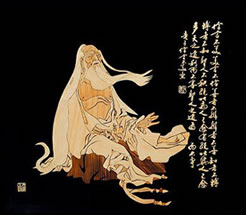
Tao Te Ching in Chinese characters and English (includes a word by word key)
from YellowBridge
Tao Te
Ching in Chinese characters, Hanyu Pinyin (1982) Romanization, English
and German by Dr. Hilmar Alquiros.
Laozi Daodejing: Chapters with Chinese characters, seal script, detailed
word by word concordance, Pinyin (tone#), German, French and English.
Chinese and English Dictionary, MDGB
Google Translator
Chinese Character Dictionary
Dao De Jing
Wade-Giles Concordance by Nina, Dao is Open
Dao De Jing English and Wade-Giles Concordance by Mike Garofalo
Tao Te Ching in Pinyin Romanization with Chinese characters, WuWei
Foundation
Tao Te Ching in Pinyin Romanization
Tao
Te Ching in Chinese characters and English
Tao Te Ching: English translation, Word by Word Chinese and English, and
Commentary, Center Tao by Carl Abbott
Tao Te Ching in Chinese
characters, English, Word by word analysis, Zhongwen
Tao Te Ching: The Definitive Edition Chinese characters, Wade-Giles (1892) Romanization, and a list of meanings for each
character by Jonathan Star
Chinese characters, Wade-Giles (1892) Romanization, and a list of meanings for each
character by Jonathan Star
Tao Te Ching in Chinese characters: Big 5 Traditional and GB Simplified
Convert from Pinyin to Wade Giles to Yale Romanizations
of Words and Terms: A Translation Tool from Qi
Journal
Chinese Characters, Wade-Giles and Pinyin Romanizations, and 16 English
Translations for Each Chapter of the Daodejing by Mike Garofalo.
Tao Te Ching in Chinese characters, Wade-Giles
and Pinyin Romanization
spellings, English; a word for word translation of the Guodian Laozi Dao
De Jing Version.
Lao Zi's Dao De Jing: A Matrix Translation with Chinese Text by
Bradford Hatcher.
"Do that which consists in taking no action;
Pursue that which is not meddlesome;
Savor that which has no flavor.
Make the small big and the few many;
Do good to him who has done you an injury.
Lay plans for the accomplishment of the difficult before it becomes
difficult;
Make something big by starting with it when small.
Difficult things in the world must needs have their beginnings in the easy;
Big things must needs have their beginnings in the small.
Therefore it is because the sage never attempts to be great that he succeeds
in becoming great.
One who makes promises rashly rarely keeps good faith;
One who is in the habit of considering things easy meets with frequent
difficulties.
Therefore even the sage treats some things as difficult.
That is why in the end no difficulties can get the better of him."
- Translated by
D. C. Lau, Chapter 63
"Act without lust of result; work without anxiety; taste without
attachment to flavour; esteem small things great and few things many;
repel violence with gentleness.
Do
great things while they are yet small, hard things while they are yet
easy; for all things, how great or hard soever, have a beginning when
they are little and easy. So thus the wise man accomplisheth the
greatest tasks without undertaking anything important.
Who
undertaketh thoughtlessly is certain to fail in attainment; who
estimateth things easy findeth them hard. The wise man considereth even
easy things hard, so that even hard things are easy to him."
- Translated (Interpolated) by
Aleister Crowley,
1918, Chapter 63
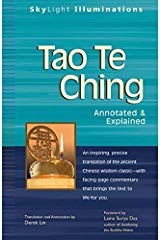
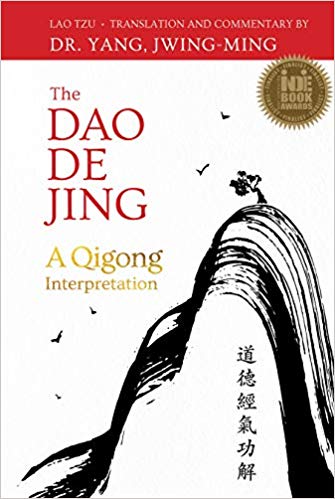
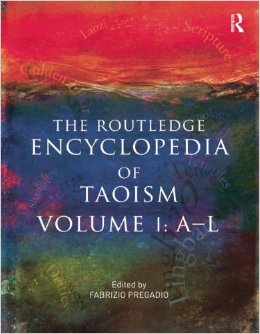
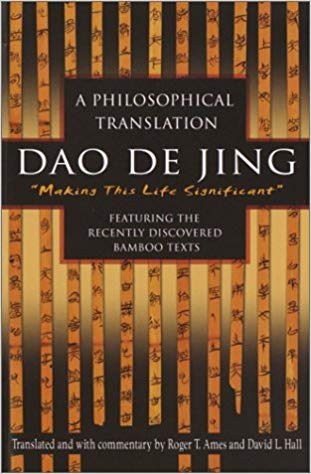
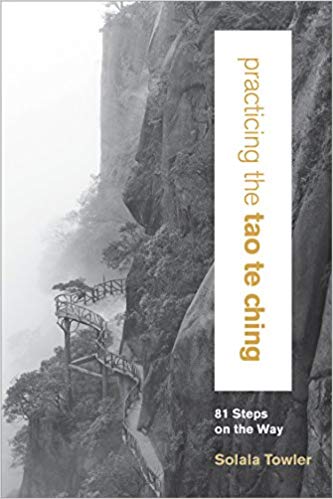
The Routledge Encyclopedia of Taoism
The Complete Works of Lao Tzu: Tao Teh Ching & Hua Hu Ching Translation and elucidation by Hua Ching Ni
Translation and elucidation by Hua Ching Ni
Tai Chi Chuan, Qigong,
Taoist Body-Mind Arts and Practices
The Dao De Jing: A Qigong Interpretation by Dr. Yang Jing-Ming
How to Live a Good Life:
Advice from Wise Persons
Dao De Jing: A Philosophical Translation by Roger T. Ames and David L.
Hall
Practicing the Tao Te Ching: 81 Steps on the Way by Solala Towler
"Do without doing,
Be involved without being involved.
Taste without tasting.
Make the great small and the many few,
Respond to resentment using kindness.
Plan difficulty out from its easy.
Do the great out from its small.
All difficulties under heaven must arise from the easy.
All that is great under heaven must arise from the small.
Accordingly, the wise man, in the end, doesn’t support greatness,
For this reason he is able to accomplish greatness.
The man that softly promises, certainly few trust.
The excessively easy, certainly excessively difficult.
Accordingly, the wise man, still of difficulty,
For this reason, in the end, without difficulty."
- Translated by
Carl Abbott,
2012, Chapter 63
"Do (wei) when there is nothing to do (wu-wei),
Manage affairs (shih) when there are none to manage,
Know (chih) by not knowing.
Regard the great as small, the much as little.
Repay injury (yüan) with te.
Plan the difficult while it is easy.
Accomplish (wei) the great when it is small.
Difficult affairs of the world,
Must be done while they are easy.
Great affairs of the world,
Must be done while they are small.
The sage never does anything great,
Therefore he can accomplish the great.
He who makes promises lightly seldom keeps his words.
He who takes much to be easy finds much to be difficult.
Therefore even the sage takes things to be difficult,
So that in the end they are not difficult."
- Translated by
Ellen Marie Chen,
1989, Chapter 63
"Take no willful action,
Diffuse contentious even to nonevent,
Transform the tasteless tasteful.
Big or small, numerous or few,
Repay enmities with virtue.
Anticipate difficulties while it is still easy,
Prepare for being big while it is still small.
Difficult problems in the world must have grown from what used to be easy,
Great events in the world must have started from what used to be small.\
So the sage does not aim to be great,
Thus he can achieve greatness.
Light promises often result in loss of credibility,
Easy encounters often are followed by difficulties.
So even the sage anticipates difficulty,
Thus he encounters no difficulty."
- Translated by
David Hong Cheng,
2000, Chapter 63
Tao Te Ching Translated by Arthur Waley
Translated by Arthur Waley
Tai Chi Chuan, Qigong,
Taoist Body-Mind Arts and Practices
How to Live a Good Life:
Advice from Wise Persons
Tao - The Way Translated by Lionel and and Herbert Giles
Translated by Lionel and and Herbert Giles




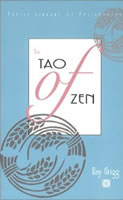
"One should avoid assertion (wu wei) and practice inaction.
One should learn
to find taste in the tasteless, to enlarge the small things, and multiply the
few.
He should respond to hatred with kindness.
He should resolve a difficulty
while it is easy, and manage a great thing while it is small.
Surely all the
world’s difficulties arose from slight causes, and all the world’s great affairs
had small beginnings.
Therefore the wise man avoids to the end participation in great affairs and
by so doing establishes his greatness.
Rash promises are lacking in faith and many things that appear easy are full
of difficulties.
Therefore the wise man considers every thing difficult and so
to the end he has no difficulties."
- Translated by Dwight Goddard and Henri Borel, 1919, Chapter 63
"Act in the state of non-action;
Work but do not work for gain;
Taste but do not taste for the taste.
Never mind if it is big, small, many, or few,
Just repay injury with benevolence.
To do the difficult we start with the easy.
To do the great thing we start with the small.
All the difficult tasks under heaven must
begin with the easy parts.
All the great achievements under heaven must
begin with the small steps.
The Sage never sets out to do great things.
That way he accomplishes great results.
Those who make easy promises will not be trusted.
Those who say everything is easy
will often have difficulty accomplishing their tasks,
The Sage, on the other hand, takes on the easy tasks as
he takes on the difficult.
So in the end no difficulty will hold him up."
- Translated by
Lok Sang Ho,
2002, Chapter 63
"Act with non-action.
Handle duties with non-interference.
Taste that which is without-flavor.
Greatness is insignificant, too much is less.
Repay animosity with De.
Plan for the difficult while it is easy.
Act on the great while it is tiny.
In the world, difficult duties certainly start while easy.
In the world, great duties certainly start while tiny.
Thus the sage in the end does not act great,
Therefore he can achieve his greatness.
Men who make promises lightly, certainly few will trust.
Men who expect most duties to be easy will certainly have many difficulties.
Thus the sage plans for things to be difficult,
Therefore in the end he is without difficulty!"
- Translated by
Bruce R. Linnell,
2015, Chapter 63
"Begin
with the easy
And do without doing
There isn't a thing
That you should be pursuing
Begin
with the simple
There's no need attacking
Your greatness will lie
In all that you're lacking
Tackle
problems when they're small
And still subject to solution
The largest problem is resolved
By simple deeds of diminution
Can
you center every day
And see all the seers see
Empty here and brimming there
A marvelous asymmetry?"
- Translated by
Jim Clatfelder, 2000, Chapter 63
Tai Chi Chuan,
Qigong, Taoist Body-Mind Arts and Practices
Tai Chi Chuan, Qigong,
Taoist Body-Mind Arts and Practices
How to Live a Good Life:
Advice from Wise Persons
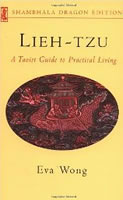
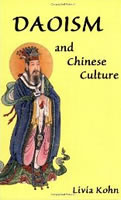
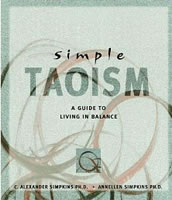
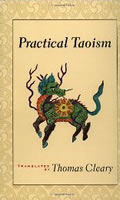
"Do things non-coercively (wuwei),
Be non-interfering in going about your business (wushi),
And savor the flavor of the unadulterated in what you eat.Treat the small as
great and the few as many.
Requite enmity with character (de).
Take account of the difficult while it is still easy,
And deal with the large while it is still tiny.
The most difficult things in the world originate with the easy,
And the largest issues originate with the tiny.
Thus, it is because the sages never try to do great things
That they are indeed able to be great.
One who makes promises lightly is sure to have little credibility;
One who finds everything easy is certain to have lots of difficulties.
Thus, it is because even the sages pay careful attention to such things
That they are always free of difficulties."
- Translated by
Roger T. Ames and David L Hall, 2003, Chapter 63
"Act non-action; undertake no undertaking; taste the tasteless.
The Sage desires the desireless, and prizes no articles that are difficult to get.
He learns no learning, but reviews what others have passed through.
Thus he lets all things develop in their own natural way, and does not venture to act.
Regard the small as the great; regard the few as many.
Manage the difficult while they are easy;
Manage the great while they are small.
All difficult things in the world start from the easy.
All the great things in the world start from the small.
The tree that fills a man's arms arises from a tender shoot.
The nine-storied tower is raised from a heap of earth;
A thousand miles' journey begins from the spot under one's feet.
Therefore the Sage never attempts great things, and thus he can achieve what is great.
He who makes easy promises will seldom keep his word;
He who regards many things as easy will find many difficulties.
Therefore the Sage regards things as difficult, and consequently never has difficulties."
- Translated by
Ch'u Ta-Kao,
1904, Chapter 63
"Do nothing-doing;
Manage nothing-managing;
Taste nothing-tasting.
Exalt the low;
Multiply the few;
Requite hatred with virtue.
Tackle the difficult when it is easy.
Handle the big when it is small.
Difficult things beneath heaven
Are made up of easy things.
Big things beneath heaven
Are made up of small things.
Thus the sage
Never deals with the great,
But accomplishes greatness.
Light promises indeed lack trust,
Much easiness leads to much difficulty.
Thus the sage
Holds everything difficult,
But meets no difficulty in the end."
- Translated by
Herrymoon Mauer,
1985, Chapter 63

This webpage work is licensed under a Creative Commons Attribution-NonCommercial-NoDerivatives 4.0 International License.
Created by Michael P. Garofalo,
Green
Way Research, Valley Spirit
Center, Gushen Grove Notebooks, Vancouver, Washington © 2020 CCA 4.0
Tao Te Ching Annotated translation by Victor Mair
Annotated translation by Victor Mair
Ripening Peaches: Taoist
Studies and Practices By Mike Garofalo
Tao Te Ching on The Art of Harmony By
Chad Hansen.
Tai Chi Chuan,
Qigong, Taoist Body-Mind Arts and Practices
How to Live a Good Life:
Advice from Wise Persons

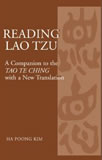
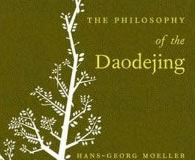
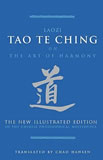
"Act by not acting;
do by not doing.
Enjoy the plain and simple.
Find that greatness in the small.
Take care of difficult problems
while they are still easy;
Do easy things before they become too hard.
Difficult problems are best solved while they are easy.
Great projects are best started while they are small.
The Master never takes on more than she can handle,
which means that she leaves nothing undone.
When an affirmation is given too lightly,
keep your eyes open for trouble ahead.
When something seems too easy,
difficulty is hiding in the details.
The master expects great difficulty,
so the task is always easier than planned."
- Translated by
John H. McDonald,
1996, Chapter 63
"It acts without action, does without doing,
Finds flavour in what is flavourless,
Can make the small great and the few many,
“Requites injuries with good deeds,
Deals with the hard while it is still easy,
With the great while it is still small.”
In the governance of empire everything difficult
Must be dealt with while it is still easy,
Everything great must be dealt with while it is still small.
Therefore the Sage never has to deal with the great;
And so achieves greatness.
But again “Light assent inspires little confidence
And 'many easies' means many a hard.”
Therefore the Sage knows too how to make the easy difficult,
And by doing so avoid all difficulties!"
- Translated by
Arthur Waley,
1934, Chapter 63
"Act without doing;
work without effort.
Think of the small as large
and the few as many.
Confront the difficult
while it is still easy;
accomplish the great task
by a series of small acts.
The Master never reaches for the great;
thus she achieves greatness.
When she runs into a difficulty,
she stops and gives herself to it.
She doesn't cling to her own comfort;
thus problems are no problem for her."
- Translated by
Stephen Mitchell, 2006, Chapter 63
Chapter 63 Read by Mike Garofalo (WMA,
3:41 Minutes, 886 Kb, 2006)
This reading uses the translations by Roger T. Ames, David L. Hall,
and by Stephen Mitchell.
Notes on Chapter 63
Tai Chi Chuan, Qigong,
Taoist Body-Mind Arts and Practices
How to Live a Good Life:
Advice from Wise Persons
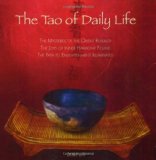
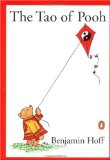

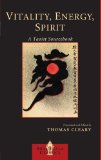
"Assert non-assertion.
Practice non-practice.
Taste the tasteless.
Make great the small.
Make much the little.
Requite hatred with virtue.
Contemplate a difficulty when it is easy.
Manage a great thing when it is small.
The world's most difficult undertakings necessarily originate while easy,
And the world's greatest undertakings necessarily originate while small.
Therefore the holy man to the end does not venture to play the great,
and
thus he can accomplish his greatness.
Rash promises surely lack faith, and many easy things
surely involve in many
difficulties.
Therefore, the holy man regards everything as difficult,
and thus to the end
encounters no difficulties."
- Translated by
D. T. Suzuki and Paul Carus, 1913,
Chapter 63
"Act without taking action.
Be busy without busy-ness.
Taste what cannot be tasted.
Magnify the small
Multiply the few.
Repay injury with kindness.
Prepare for the difficult while it is still easy.
Work on the big thing while it is still small.
The difficult things of the world are initially easy.
The big things of the world are initially small.
The sage does not strive to achieve great things
So he is able achieve greatness.
Those who are quick to make promises
Are bound not to be trusted.
What may seem easy
Is bound to become hard.
The sage accepts his tasks as difficult.
Therefore they all become easy for him."
- Translated by
Agnieszka Solska, 2005, Chapter 63
"Act in repose;
Be at rest when you work;
Relish unflavored things.
Great or small,
Frequent or rare,
Requite anger with virtue.
Take hard jobs in hand
While they are easy;
And great affairs too
While they are small.
The troubles of the world
Cannot be solved except
Before they grow too hard.
The business of the world
Cannot be done except
While relatively small.
The Wise Man, then, throughout his life
Does nothing great and yet achieves
A greatness of his own.
Again, a promise lightly made
Inspires little confidence;
Or often trivial, sure that man
Will often come to grief.
Choosing hardship, then, the Wise Man
Never meets with hardship all his life."
- Translated by
Raymond Blackney, 1955, Chapter 63
Walking the Way: 81 Zen Encounters with the Tao Te Ching by Robert Meikyo Rosenbaum
by Robert Meikyo Rosenbaum
The Tao of Zen by Ray Grigg
by Ray Grigg
Tao Te Ching: Zen Teachings on the Taoist Classic by Takuan Soho
by Takuan Soho
Buddhism and Taoism Face to Face: Scripture, Ritual, and Iconographic Exchange in Medieval China by Christine Mollier
by Christine Mollier

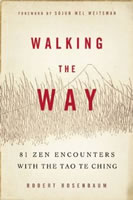
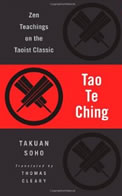
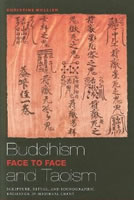
"Be active, with the Activity of Inner Life.
Serve, with the Service of Inner Life.
Be fragrant, with the Fragrance of Inner Life.
The great shall be small,
The many shall be few, and
Evil shall be recompensed by goodness.
Mediate on difficult things till they become easy.
Do great deeds till they appear to be small.
To serve men in difficult things,
We must begin by easy things.
To serve men in great things,
We must begin by doing small things.
That is why the self-controlled man to the end of life
does not become great,
and thus he can perfect his greatness.
The Master has little faith in a quickly mad promise.
Many things are easy, many are also difficult.
The self-controlled man takes hold of difficulties.
To the end of life he solves difficulties in the Inner Life."
- Translated by
Isabella Mears, 1916, Chapter 63
"Act disinterestedly - without intending that your action shall change
the course of Nature.
Behave indifferently - without trying to impose
your own ideas upon the lives of others.
Appreciate natural flavours -
without adulterating natural foods with artificial flavours.
Accept the fact that what is small grows big, and what are few become
many.
Respond intelligently even to unintelligent treatment.
Take care of what is difficult while it is still easy, and deal with
what will
become big while it is yet small;
For all difficult things
originate in what is easy.
The most difficult things in the world Must be accomplished through
the easiest.
The greatest things in the world Must be accomplished
through the smallest.
Therefore the intelligent man, although never troubling himself with
big things,
still accomplishes the same result by dealing with them
when they are small.
He who is careless about things when they are easy will have to face them
when they become difficult.
Therefore the intelligent man, although dealing with things which will
become difficult,
does so by attending to them while they are not
difficult."
- Translated by
Archie J. Bahm, 1958, Chapter 63
"Act by not acting.
Work without effort.
Savour the tasteless.
See much in the few and greatness in the small.
Reward injury with kindness.
Plan the difficult while it is still easy.
Accomplish greatness in small things.
Under Heaven, difficult things consist of easy things.
Under Heaven, great actions consist of small deeds.
The Sage never attempts anything great,
And thus accomplishes greatness.
He who takes his promises lightly will not be trusted.
He who thinks everything is easy will meet many difficulties.
This is why the Sage regards everything as difficult,
And therefore never meets with any difficulties."
- Translated by
Keith H. Seddon, Chapter 63
Further Teachings of Lao-Tzu: Understanding the Mysteries (Wen
Tzu) Translated by Thomas Cleary
Translated by Thomas Cleary
The Lunar Tao: Meditations in Harmony with the Seasons By Deng Ming-Dao
By Deng Ming-Dao
Awakening to the Tao By Lui I-Ming (1780) and translated by Thomas Cleary
By Lui I-Ming (1780) and translated by Thomas Cleary
Tai Chi Chuan, Qigong,
Taoist Body-Mind Arts and Practices
How to Live a Good Life:
Advice from Wise Persons
Ripening Peaches: Taoist
Studies and Practices By Mike Garofalo
Zhuangzi: The Essential Writings with Selections from Traditional Commentaries Translation and commentary by Brook Ziporyn
Translation and commentary by Brook Ziporyn
The Inner Chapters of Chuang Tzu (Zhuangzi)
Translated by A. C. Graham
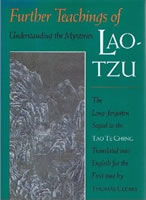
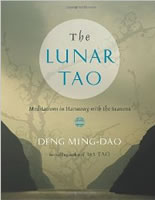
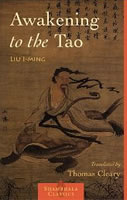
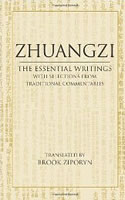
"Act the non-acting, let dealing go
on without dealings,
In the tasteless find taste, let
the great in the little be known,
Find in the few that therein are
embodied the many,
And recompense hatred with deeds
of goodness alone.
Consider what may become
difficult, while it is easy,
Manage the great, by taking it
while it is small,
From the easy arise all the
difficult things under heaven,
And affairs that are great their
source in the little recall.
So the sage, not acting the great,
the great will accomplish,
Who promises lightly lacks truth,
and they who believe
Many things to be easy will find
many hard, while the sage
With the difficult, even, finds
nothing too hard to achieve."
- Translated by
Isaac Winter Heysinger, 1903, Chapter 63
"Act through no-action,
Attend to no-affair,
Relish no-flavor,
Take the small as big and the few as many.
Repay hatred with Te.
Plan difficult things while they are easy.
Handle big things while they are small.
Difficult things under Heaven
Always arise from what is easy;
Big things under Heaven
Always arise from what is small.
For this reason the sage
Never intends big things,
And thus can accomplish big things.
He who agrees lightly invariably inspires little faith.
He who considers many things easy invariably encounters many difficulties.
For this reason even the sage considers things difficult;
Therefore he never encounters difficulties."
- Translated by
Ha Poong Kim, Chapter 63
Aufgabenmeisterung durch rechtzeitiges Erkennender
Schwierigkeiten
Wirkt durch Nichtwirken! Handelt durch Nichthandeln!
Findet Geschmack an dem, was keinen Genuß birgt!
Sehet das Große im Kleinen, das Viele im Wenigen!
Begegnet dem Haß mit der innerlichsten Kraft eurer Herzen!
Erkennet das Schwierige, ehe es schwierig ist!
Laßt Großes werden, indem ihr das Kleine achtet!
Alles Schwierige auf Erden beginnt einfach,
alles Große beginnt klein.
So kümmert sich auch der Weyse nicht um sein Heyl,
darum findet er es.
Wer leichtfertig verspricht, ist nicht glaubwürdig.
Wer leichtfertig handelt, dem erwachsen Schwierigkeiten.
Der Weyse erkennt rechtzeitig die Schwierigkeiten,
darum vermag er alles zu meistern."
- Translated
by Rudolf
Backofen, 1949, Chapter
"Wer das Nichthandeln übt, sich mit Beschäftigungslosigkeit
beschäftigt,
Geschmack findet an dem, was nicht schmeckt:
Der sieht das Große im Kleinen und das Viele im Wenigen.
Er vergilt Groll durch Leben.
Plane das Schwierige da, wo es noch leicht ist!
Tue das Große da, wo es noch klein ist!
Alles Schwere auf Erden beginnt stets als Leichtes.
Alles Große auf Erden beginnt stets als Kleines.
Darum: Tut der Berufene nie etwas Großes,
So kann es seine großen Taten vollenden.
Wer leicht verspricht, hält sicher selten Wort.
Wer vieles leicht nimmt, hat sicher viele Schwierigkeiten.
Darum: Bedenkt der Berufene die Schwierigkeiten, so hat er nie Schwierigkeiten."
- Translated by Richard Wilhelm, 1911, Chapter
63
"Practice non-action.
Be concerned with
non-concern.
Taste the flavorless.
Account the small as great,
and the few as many.
For hatred return perfection.
Manipulate difficulties while they are easy.
Take in hand great
things while they are insignificant.
Every difficult thing in
the world had its origin in what was at first easy.
Every great
thing in the world was once significant.
Therefore, the Holy Man
makes no distinctions and thus he is able to accomplish that
which is great.
Small faith can be placed in promises lightly made.
The easier a matter is reckoned the more difficult it proves at
the last;
for this reason the Holy Man sees difficulties in
everything, and therefore he encounters no difficulties."
- Translated by
C. Spurgeon Medhurst, 1905, Chapter 63

This webpage work is licensed under a Creative Commons Attribution-NonCommercial-NoDerivatives 4.0 International License.
Created by Michael P. Garofalo,
Green
Way Research, Valley Spirit
Center, Gushen Grove Notebooks, Vancouver, Washington © 2020 CCA 4.0
Tao Te Ching: An Illustrated Journey Translated by Stephen Mitchell
Translated by Stephen Mitchell
Tao Te Ching Translated by David Hinton
Translated by David Hinton
The Book of Tao: Tao Te Ching - The Tao and Its Characteristics Translated by James Legge
Translated by James Legge
Ripening Peaches: Taoist
Studies and Practices
Taoism: Growth of a Religion By Isabelle Robinet
By Isabelle Robinet
Tai Chi Chuan, Qigong,
Taoist Body-Mind Arts and Practices
How to Live a Good Life:
Advice from Wise Persons
Zhuangzi (Chuang Tsu),
Daoist Scripture: Bibliography, Links, Resources, Quotations, Notes
Zhuangzi: Basic Writings Translated by Burton Watson
Translated by Burton Watson
Zhuangzi Speaks: The Music of Nature An illustrated comic by Chih-chung Ts'ai
An illustrated comic by Chih-chung Ts'ai
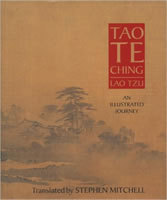
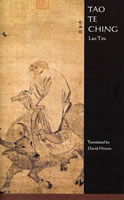
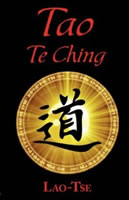
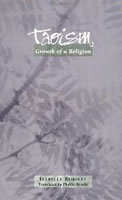
"Acting without design, occupying oneself without making a business of
it,
finding the great in what is the small, and the many in the few,
repaying injury with kindness, effecting difficult things while they are
easy,
and managing great things in their beginnings, is the method of
Tao.
All difficult things have their origin in that which is easy,
and the great things in that which is small.
Therefore the wise man can accomplish great things without even attempting them.
He who lightly assents will seldom keep his word.
He who accounts all things easy will have many difficulties.
Therefore the Sage takes great account of small things,
and so never has any difficulty."
- Translated by
Walter Gorn Old, 1904, Chapter 63
"Be a Non Doer work at Not Working acquire a taste for that which has no taste.
Treat small things as though they were great treat few things as
though they were many. "Reward what is injurious, with kind Te."
Plan difficult things focusing on the easy parts do great things focusing on the small details.
Difficult tasks in the world always begin from what is easy great tasks in the world always begin from what is small.
And so the Wise Person: Does not 'do great things' and so is able to fulfill his greatness.
Yes: Light agreement is never very trustworthy considering everything easy makes everything difficult.
And so the Wise Person: Treats things as difficult, and in the end has no difficulty."
- Translated by
Michael LaFargue, 1992, Chapter 63
"Act through Non-action.
Do without doing.
Taste the tasteless.
Great or small, many or few, repay injury with kindness.
Plan to tackle the difficult when it is easy.
Undertake the great while it is small.
Begin the most difficult task in the world while it is still easy.
Begin the greatest task in the world while it is still small.
That is how the Sage becomes great without striving.
One who makes promises easily is inevitably unreliable.
One who thinks everything is easy eventually finds everything difficult.
That is why the Sage alone regards everything as difficult and in the end finds no difficulty at all."
- Translated by
Tam C. Gibbs, 1981, Chapter 63
"Le sage pratique le non-agir, il s'occupe de la
non-occupation, et savoure ce qui est sans saveur.
Les choses grandes ou petites, nombreuses ou rares, sont égales à ses yeux.
Il venge ses injures par des bienfaits.
Il commence par des choses aisées, lorsqu'il en médite de difficiles; par de
petites choses, lorsqu'il en projette de grandes.
Les choses les plus difficiles du monde on nécessairement commencé par être
aisées.
Les choses les plus grandes du monde ont nécessairement commencé par être
petites.
De là vient que, jusqu'à la fin, le Saint ne cherche point à faire de grandes
choses; c'est pourquoi il peut accomplir de grandes choses.
Celui qui promet à la légère tient rarement sa parole.
Celui qui trouve beaucoup de choses faciles éprouve nécessairement de grand
difficultés.
De là vient que le Saint trouve tout difficile; c'est pourquoi, jusqu'au terme
de sa vie, il n'éprouve nulles difficultés."
- Translated by Stanislas Julien, 1842, Chapter
63
Spanish
Language Versions of the Tao Te Ching (Daodejing)
Tao Te Ching en Español
Lao Tsé Tao Te Ching  Traducido al
español por Anton
Teplyy
Traducido al
español por Anton
Teplyy
Tao Te Ching
Traducido por
Stephen Mitchell,
versión
española
Tao Te Ching
Traducido al
español por el Padre
Carmelo
Elorduy
Tao Te Ching en Español
Lao Tzu-The Eternal Tao Te Ching Traducido al
español por
Yuanxiang
Xu y Yongjian Yin
Traducido al
español por
Yuanxiang
Xu y Yongjian Yin
Ripening Peaches: Taoist
Studies and Practices By Mike Garofalo
Maduración
Duraznos: Estudios y
Prácticas Taoístas por Mike Garofalo
Tao Te Ching -
Wikisource
Tao Te Ching Traducido al
español por
William
Scott Wilson.
Traducido al
español por
William
Scott Wilson.
Lao Tzu - Tao Te Ching Traducido al
español por
Javier Cruz
Traducido al
español por
Javier Cruz
Tao te king Translated by John C. H. Wu,
,
versión
española
Translated by John C. H. Wu,
,
versión
española
Daodejing
Español, Inglés, y
Chino Versiones Lingüísticas de
la Daodejing
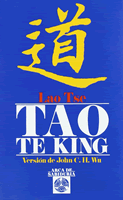
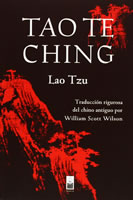
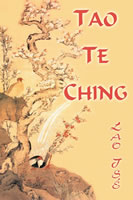
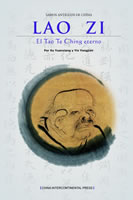
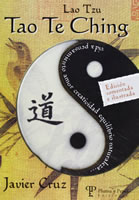
Spanish
Language Translations of the Tao Te Ching
"Practica la no-acción,
ejecuta el no-hacer,
prueba lo sin-sabor,
considera grande a lo pequeño
y mucho a lo poco.
Ataca una difficultad en sus elementos fáciles;
lleva a cabo una obra grande a través de actos menores.
La cosa más difícil del mundo
se reduce finalmente a elementos fáciles.
La obra más grandiosa se lleva a cabo
necesariamente a través de actos menores.
El santo no emprende nada grande
y así puede rematar su propia magnitud.
El que promete a la ligera rara ves cumple su palabra.
El que encuentra todo fácil experimenta
necesariamente muchas dificultades.
El santo considera todo difícil
y no ecuentra finalmente ninguna dificultad."
- Translated by Alba, 1998,
Tao Te Ching, Capítulo 63
"Actuar y no actuar,
realizar y no realizar,
sabroso e insípido,
grande y pequeño,
mucho y poco,
en todo rige la virtud.
Acomete la dificultad por su lado más fácil.
Ejecuta lo grande comenzando por lo más pequeño.
Las cosas más difíciles se hacen siempre abordándolas
en lo que es más fácil,
y las cosas grandes en lo que es más pequeño.
Por eso el sabio nunca realiza cosas grandes,
y así es como puede llevar a cabo grandes cosas.
El que promete a la ligera,
no cumple con su promesa.
El que todo lo encuentra fácil,
hallará la vida difícil.
Por eso, el sabio en todo considera la dificultad,
y en nada la halla."
- Translation from
Wikisource, 2013,
Tao Te Ching, Capítulo 63
"Actúa no actuando.
Descubre tu sabroso en lo insípido.
Halla la grandeza en lo pequeño.
Encuentra lo mucho en lo poco.
Devuelve el odio con la comprensión.
Emprende lo difícil en su facilidad.
Usa lo pesado en su levedad.
Las cosas más difíciles del mundo, deben ser fáciles en sus principios.
Las cosas más grandes del mundo, deben ser pequeñas en sus comienzos.
Por eso el hombre sabio no hace cosas grandes en su vida
aun siendo él el único
capaz de hacerlas.
Quien fácilmente promete difícilmente cumple.
Quien cree que todo es fácil encuentra muchas dificultades.
Por tu tanto: El hombre sabio considera todo como difícil y jamás encuentra
dificultades."
- Translation from
Logia Medio Dia, 2015,
Tao Te Ching, Capítulo 63
"Practica el no-actuar,
dedícate a no ocuparte en nada,
saborea lo que no tiene sabor.
Considera grande lo pequeño y mucho lo poco,
responde a la injusticia con la virtud.
Intenta lo difícil en lo fácil,
realiza lo grande en lo menudo.
Las cosas difíciles del mundo comienzan en lo fácil,
realiza lo grande en lo menudo.
Las cosas difíciles del mundo comienzan por lo fácil,
las cosas grandes del mundo comienzan por lo menudo.
Por eso el sabio nunca realiza cosas grandes,
y así es como puede llevar a cabo grandes cosas.
Quien promete a la ligera gozará de escaso mérito,
quien supone todo fácil encontrará todo difícil,
esa es la razón de que al final no encuentre ninguna dificultad."
- Translated by
Juan Ignacio
Preciado, 1978, Capítulo 63
"Actuar y no actuar,
realizar y no realizar,
sabroso e insípido,
grande y pequeño,
mucho y poco,
en todo rige la virtud.
Acomete la dificultad por su lado más fácil.
Ejecuta lo grande comenzando por lo más pequeño.
Las cosas más difíciles se hacen siempre abordándolas
en lo que es más fácil,
y las cosas grandes en lo que es más pequeño.
El sabio no emprende grandes cosas,
y en ello está su propia grandeza.
El que promete a la ligera
merece poco crédito.
El que todo lo encuentra fácil
difícil le será todo.
Por esto, el sabio en todo considera la dificultad,
y en nada la halla."
- Spanish Version Online at
RatMachines,
Tao Te Ching, Capítulo 63

This webpage work is licensed under a Creative Commons Attribution-NonCommercial-NoDerivatives 4.0 International License.
Created by Michael P. Garofalo,
Green
Way Research, Valley Spirit
Center, Gushen Grove Notebooks, Vancouver, Washington © 2020 CCA 4.0
Commentary, Notes, Links,
Comparisons, Suggestions
Chapter 63
By Mike Garofalo
"Confront the difficult
while it is still easy;
accomplish the great task
by a series of small acts."
- Translated by
Stephen Mitchell, 2006, Chapter 63
Proverbial practical advice for daily living from the
Old Master. A long journey best begins by getting up early; but, even if
you don't wake up until you are 55, you can still begin the Journey today.
Break the task down into steps, pay attention to the details, exert effort, and
persist. Persistence
and willpower result in a "series of small acts" that accumulate into and
accomplish greater tasks. Don't get behind, it only makes matters more
difficult and anxiety producing.
"But I say unto you which hear, 'Love your enemies, do
good to them which hate you;
Bless them that curse you, and pray for them which despitefully use you.
And unto him that smiteth thee on the one cheek offer also the other;
and him that taketh away thy cloke forbid not to take thy coat also.
Give to every man that asketh of thee; and of him that taketh away thy goods
ask them not again.
And as ye would that men should do to you, do ye also to them likewise.'
- Gospel of Luke, 100 CE,
6:27-31, 'Sermon on the Plain' by Jesus
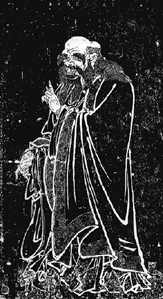
Next
Chapter of the Tao Te Ching #64
Previous Chapter of the Tao Te Ching #62
Chapter and Thematic Index to the Tao Te Ching
Tao Te Ching
Commentary, Interpretations, Research Tools, Resources
Chapter 63
Das Tao Te King von Lao Tse. Complete versions of all 81 Chapters of
the Tao Te Ching by many different translators in many languages: 124
English, 24 German, 14 Russian, 7 Spanish, 5 French and many other languages.
Links are organized first by languages, and then alphabetically by translators. Formatting
varies somewhat. The original website at Onekellotus went offline in 2012; but, the
extensive collection of these Tao Te Ching versions was
saved for posterity by the Internet Archive Wayback Machine and available as of
9/9/2015. This is an outstanding original collection of
versions of the Daodejing─ the Best on the Internet. Caution:
copyright infringement may sometimes be an issue at this website.
Tao Te Ching, Translations into English: Terebess Asia Online (TAO). 124
nicely formatted complete English language translations, on separate webpages, of the Daodejing.
Alphabetical index by translators. Each webpage has all 81 chapters of the Tao Te
Ching translated into English. A useful collection! Many
reformatted and colored versions from the original collection at
Das Tao Te King von Lao Tse. Caution: copyright infringement may
sometimes be an
issue at this website.
Lao Tzu: Te-Tao Ching - A New Translation Based on the Recently Discovered Ma-wang-tui
Texts (Classics of Ancient China) Translated with and introduction and detailed exposition and commentary by
Professor Robert G. Henricks. New York, Ballantine Books, 1992.
Includes Chinese characters for each chapter. Bibliography, detailed
notes, 282 pages.
Translated with and introduction and detailed exposition and commentary by
Professor Robert G. Henricks. New York, Ballantine Books, 1992.
Includes Chinese characters for each chapter. Bibliography, detailed
notes, 282 pages.
Daodejing by Laozi: Chapters with Chinese characters, seal script,
detailed word by word concordance, Pinyin (tone#), German, French and English.
This is an outstanding resource for serious students of the Tao Te Ching.
Tao Te
Ching: A New Translation and Commentary. By Ellen Chen. Paragon
House, 1998. Detailed glossary, index, bibliography, notes, 274 pages.
The Tao
and Method: A Reasoned Approach to the Tao Te Ching. By Michael
Lafargue. New York, SUNY Press, 1994. 640 pages. Detailed
index, bibliography, notes, and tables. An essential research tool.
Two Visions of the Way: A Study of the Wang Pi and the Ho-Shang Kung Commentaries on the Lao-Tzu.
By Professor by Alan Kam-Leung Chan. SUNY Series in Chinese
Philosophy and Culture. State University of New York Press, 1991.
Index, bibliography, glossary, notes, 314 pages.
ISBN: 0791404560.
Tao Te Ching: The Definitive Edition By Jonathan Star. Translation, commentary and research tools. New
York, Jeremy P. Tarcher, Penguin, 2001. Concordance, tables, appendices,
349 pages. A new rendition of the Tao Te Ching is provided, then a
verbatim translation with extensive notes. Detailed tables for each verse
provide line number, all the Chinese characters, Wade-Giles Romanization, and a list of meanings for each character. An excellent
print reference tool!
By Jonathan Star. Translation, commentary and research tools. New
York, Jeremy P. Tarcher, Penguin, 2001. Concordance, tables, appendices,
349 pages. A new rendition of the Tao Te Ching is provided, then a
verbatim translation with extensive notes. Detailed tables for each verse
provide line number, all the Chinese characters, Wade-Giles Romanization, and a list of meanings for each character. An excellent
print reference tool!
Chinese Reading of the Daodejing
Wang Bi's Commentary on the Laozi with Critical Text and Translation.
By Professor Rudolf G. Wagner. A SUNY Series in Chinese Philosophy and
Culture. English and Mandarin Chinese Edition.
State University of New York Press; Bilingual edition (October 2003). 540
pages. ISBN: 978-0791451823.
Wang Bi (Wang Pi, Fusi), 226-249 CE,
Commentary on the Tao Te
Ching.
Tao Te Ching Translated by D. C. Lau. Addison Wesley, Reprint Edition, 2000. 192
pages. ISBN: 978-0140441314.
Translated by D. C. Lau. Addison Wesley, Reprint Edition, 2000. 192
pages. ISBN: 978-0140441314.
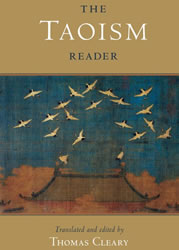
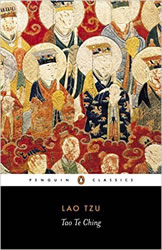
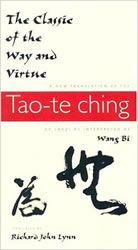
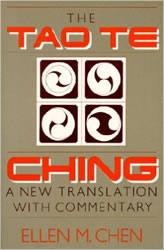

The Taoism Reader By Thomas Cleary. Shambhala, 2012. 192 pages.
By Thomas Cleary. Shambhala, 2012. 192 pages.
Change Your Thoughts - Change Your Life: Living the Wisdom of the Tao By Wayne W. Dyer. Hay House, Reprint Edition, 2009. 416 pages.
By Wayne W. Dyer. Hay House, Reprint Edition, 2009. 416 pages.
The Routledge Encyclopedia of Taoism. Edited by Fabrizio Pregadio. London, Taylor and Francis Group, Routledge,
2008, 2011. 2 Volumes, 1551 pages.
Edited by Fabrizio Pregadio. London, Taylor and Francis Group, Routledge,
2008, 2011. 2 Volumes, 1551 pages.
Lao Tzu's Tao Teh Ching, A Parallel Translation Collection. Compiled by B.
Boisen.
Tao Te Ching: The Book of the Way. Revised by Sam Torode based on the
translation by Dwight Goddard, 1919. Independent Pub., 2009, 88 pages.
Tao Te Ching: Annotated
and Explained. By Derek Lin. Foreword by Lama Surya Das.
Skylight Illuminations, SkyLight Paths, 2006. 208 pages.
Comparison and Analysis of Selected English Interpretations of the Tao Te Ching.
By Damian J. Bebell and Shannon M. Fera.
Practicing the Tao Te Ching: 81 Steps on the Way. By Solala Towler.
Foreword by Chunglang Al Huang. Sounds True, 2016. 320 pages.
The Lunar Tao: Meditations in Harmony with the Seasons .
By Deng Ming-Dao. New York, Harper Collins, 2013. 429 pages.
.
By Deng Ming-Dao. New York, Harper Collins, 2013. 429 pages.
The Classic of the Way and Virtue: A New Translation of the Tao-te Ching of Laozi as Interpreted by Wang Bi.
Translated by Richard John Lynn. Translations from the Asian Classics
Series. New York, Columbia University Press, 1999. Extensive index,
glossaries, notes, 244 pages.
Tao Te Ching in Chinese characters,
Pinyin Romanization, English and German by Dr. Hilmar
Alquiros.
Yellow Bridge
Dao De Jing Comparison Table Provides side by side comparisons of
translations of the Tao Te Ching by James Legge, D. T. Suzuki, and Dwight
Goddard. Chinese characters for each paragraph in the Chapter are on the
left; place your cursor over the Chinese characters to see the Pinyin
Romanization of the Chinese character and a list of meanings.
Translators Index,
Tao Te Ching Versions in English, Translators Sorted Alphabetically by Translator, Links to Books and
Online Versions of the Chapters
Taoism and the Tao Te
Ching: Bibliography, Resources, Links
Spanish Language
Translations of the Tao Te Ching, Daodejing en Español, Translators Index
Concordance to the
Daodejing
The Tao of Zen .
By Ray Grigg. Tuttle, 2012, 256 pages. Argues for the view that Zen
is best characterized as a version of philosophical Taoism (i.e., Laozi and
Zhuangzi) and not Mahayana Buddhism.
.
By Ray Grigg. Tuttle, 2012, 256 pages. Argues for the view that Zen
is best characterized as a version of philosophical Taoism (i.e., Laozi and
Zhuangzi) and not Mahayana Buddhism.
Chapter 1 in the
Rambling
Taoist Commentaries by Trey Smith. The
Rambling Taoists are Trey Smith and Scott Bradley.
The Philosophy of the Daodejing By Hans-Georg Moeller. Columbia University Press, 2006, 176 pages.
By Hans-Georg Moeller. Columbia University Press, 2006, 176 pages.
Valley Spirit, Gu Shen,
Concept, Chapter 6
Valley Spirit Center in Red
Bluff, California.
Sacred
Circle in the Gushen Grove.
Lao-tzu's Taoteching Translated by Red Pine (Bill Porter). Includes many brief selected
commentaries for each Chapter draw from commentaries in the past
2,000 years. Provides a verbatim translation and shows the text in Chinese
characters. San Francisco, Mercury House, 1996, Second Edition, 184 pages.
An invaluable resource for commentaries.
Translated by Red Pine (Bill Porter). Includes many brief selected
commentaries for each Chapter draw from commentaries in the past
2,000 years. Provides a verbatim translation and shows the text in Chinese
characters. San Francisco, Mercury House, 1996, Second Edition, 184 pages.
An invaluable resource for commentaries.
Reading Lao Tzu: A Companion to the Tao Te Ching with a New Translation By Ha Poong Kim. Xlibris, 2003, 198 pages.
By Ha Poong Kim. Xlibris, 2003, 198 pages.
Dao De Jing: A Philosophical Translation By Roger T. Ames and David T. Hall. Ballantine, 2003, 256 pages.
By Roger T. Ames and David T. Hall. Ballantine, 2003, 256 pages.
Thematic Index to the
81 Chapters of the Tao Te Ching
Lieh-Tzu: A Taoist Guide to Practical Living . Translated by Eva Wong. Lieh-Tzu was writing around 450 BCE. Boston, Shambhala, 2001.
Introduction, 246 pages.
. Translated by Eva Wong. Lieh-Tzu was writing around 450 BCE. Boston, Shambhala, 2001.
Introduction, 246 pages.
Revealing the Tao Te Ching: In-depth Commentaries on an Ancient Classic . By Hu Huezhi. Edited by Jesse Lee Parker. Seven Star Communications,
2006. 240 pages.
. By Hu Huezhi. Edited by Jesse Lee Parker. Seven Star Communications,
2006. 240 pages.
Cloud Hands Blog
Mike Garofalo writes about Mind-Body Arts, Philosophy, Taoism, Gardening, Taijiquan, Walking, Mysticism,
Qigong, and the Eight Ways.
The Whole Heart of Tao:
The Complete Teachings From the Oral Tradition of Lao Tzu. By John Bright-Fey. Crane Hill Publishers, 2006. 376 pages.
By John Bright-Fey. Crane Hill Publishers, 2006. 376 pages.
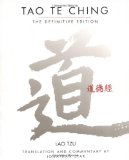
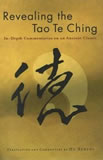

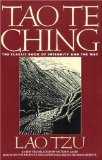
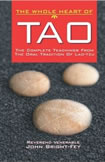
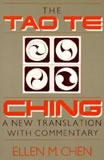
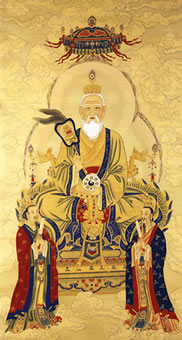
Gushen Grove Notebooks for the Tao Te Ching
Research and Indexing by
Michael P. Garofalo
Green Way Research, Valley Spirit
Center, Gushen Grove Notebooks (2001-2020)
Red Bluff, California from 1998-2017;
Vancouver, Washington from 2017-2020
Green Way Research, Tao Te Ching, Chapter 63, 2011-2020.
Compiled and
Indexed by
Michael P. Garofalo
This webpage was last modified, edited,
maintained, expanded, improved or updated on
November 26, 2019.
This webpage was first distributed online on July 3, 2011.

This webpage work is licensed under a Creative Commons Attribution-NonCommercial-NoDerivatives 4.0 International License.
Created by Michael P. Garofalo,
Green
Way Research, Valley Spirit
Center, Gushen Grove Notebooks, Vancouver, Washington © 2020 CCA 4.0
Michael P. Garofalo's E-mail
Brief Biography of Michael P. Garofalo, M.S.

Ripening Peaches: Daoist Studies and Practices
Taoism: Resources and Guides
Cloud Hands Blog
Valley Spirit Qigong
Ways of Walking
The Spirit of Gardening
Months: Cycles of the Seasons
Zhuangzi (Chuang Tzu, Zhuang Zhou, Master Chuang) 369—286 BCE
Chan (Zen) and Taoist Poetry
Yang Style Taijiquan
Chen Style Taijiquan
Taoist Perspectives: My Reading List
Meditation
Bodymind Theory and
Practices, Somaesthetics
The Five Senses
How to Live a Good Life:
Advice from Wise Persons
Grandmaster Chang San
Feng
Grandmaster Chen Man-ch'ing
Virtues
Qigong (Chi Kung) Health
Practices
One Old Daoist Druid's Final Journey: Notebooks of the Librarian of Gushen Grove
Cloud Hands: T'ai Chi Ch'uan
Tao Te Ching by Lao Tzu
Index to Cloud Hands and Valley Spirit Websites
Introduction
Index to English Language Translators of the Tao Te Ching
Concordance to the Daodejing
Recurring Themes
(Terms, Concepts, Leimotifs) in
the Tao Te Ching
Spanish
Language Translations of the Tao Te Ching
Resources
Comments, Feedback,
Kudos
Chinese Characters,
Wade-Giles (1892) and Hanyu Pinyin (1982) Romanizations
The Tao Te Ching (Dao De Jing)
by Lao Tzu (Laozi) circa 500 BCE
Cloud Hands Blog
Return to the Top of
this Webpage
Translation and elucidation by Hua Ching Ni
 Translation and elucidation by Hua Ching Ni
Translation and elucidation by Hua Ching Ni Translated by Brian Walker
Translated by Brian Walker Translated by Arthur Waley
Translated by Arthur Waley Translated by Lionel and and Herbert Giles
Translated by Lionel and and Herbert Giles By Eva Wong
By Eva Wong Translated by Eva Wong
Translated by Eva Wong  Translated by Philip Ivahoe
Translated by Philip Ivahoe
 By James Miller
By James Miller Translated by Stephen Bokencamp
Translated by Stephen Bokencamp By Alexander and Annellen Simpkins
By Alexander and Annellen Simpkins Translated by Thomas Cleary
Translated by Thomas Cleary By Livia Kohn
By Livia Kohn
 By Hu Xuzehi
By Hu Xuzehi Annotated translation by Victor Mair
Annotated translation by Victor Mair  By Ha Poong Kim
By Ha Poong Kim By Hans-Georg Moeller
By Hans-Georg Moeller  By Roger T. Ames and David T. Hall
By Roger T. Ames and David T. Hall By Arthur Waley
By Arthur Waley



























































